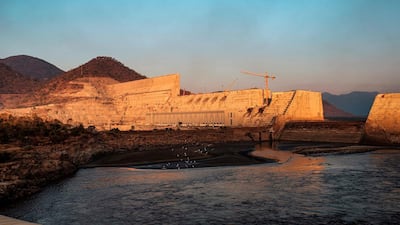Ethiopia made progress with Egypt and Sudan in US-brokered talks in easing concerns over a hotly contested mega-dam on the Nile, with a tentative agreement to fill it only during the rainy season.
The three countries had set a deadline of Wednesday to reach an accord over the Grand Renaissance Dam in Ethiopia, which Egypt fears could deplete its scarce drinking water.
After three days of talks in Washington, the countries' foreign ministers "noted the progress achieved," a joint statement said.
But they stopped short of announcing a resolution, saying the three countries would meet again in the US capital on January 28 to finalise an agreement.
Analysts have feared that the three Nile basin countries could be drawn into a conflict if the dispute is not resolved before the colossal 1.8-kilometre-long dam, under construction since 2011, begins operating.
In a draft deal, Ethiopia agreed that it will fill the dam - set to be Africa's largest hydroelectric project - only in the wet season from July to August, or also in September if conditions are right.
Ethiopia will aim rapidly to reach the level of 595 meters (1,952 feet) above sea level, with later filling to be determined based on the conditions of the river.
The filling "will be executed in stages and will be undertaken in an adaptive and cooperative manner that takes into consideration the hydrological conditions of the Blue Nile and the potential impact of the filling on downstream reservoirs," said the statement released by the United States.
The three foreign ministers "reaffirmed the importance of transboundary cooperation in the development of the Blue Nile to improve the lives of the people of Egypt, Ethiopia, and Sudan, and their shared commitment to concluding an agreement," it said.
The draft deal also calls for special mitigation measures for Egypt and Sudan on years that they are especially dry.
In early negotiations, Ethiopia had said it would fill the dam's reservoir in three years while Egypt wanted the process drawn out over 15 years.
Ethiopia says the $4.2 billion (Dh 15.4 billion) hydroelectric barrage would double its electricity and be indispensable for a growing economy. It is expected to begin generating power by the end of 2020 and be fully operational by 2022.
But Egypt fears disruption in the river that provides 90 per cent of its drinking water.
Discussions between the three countries broke down, prompting Egypt to call for international mediation.
The US Treasury Department agreed to broker talks after Egyptian President Abdel Fattah Al Sisi made a pitch to President Donald Trump, his close ally.
Ethiopian Prime Minister Abiy Ahmed, who won the Nobel Peace Prize for his democratic reforms, promised on Sunday to take into consideration the other Nile nations' concerns.
"Ethiopia always believes in a win-win approach with Egypt and Sudan," Mr Abiy said on a visit to South Africa, adding that peace was essential to "realise our vision of development and growth".
Mr Abiy also invited South Africa's President Cyril Ramaphosa, the incoming chairperson of the African Union, to help push forward negotiations on the dam.
The International Crisis Group, in a report last year, urged the three nations not to see the dam dispute as an "existential conflict" but as a way to improve resource-sharing.
"Waiting until the dam is operational - when its impact on downstream countries is clearer - would raise the risk of violent conflict," it warned.

